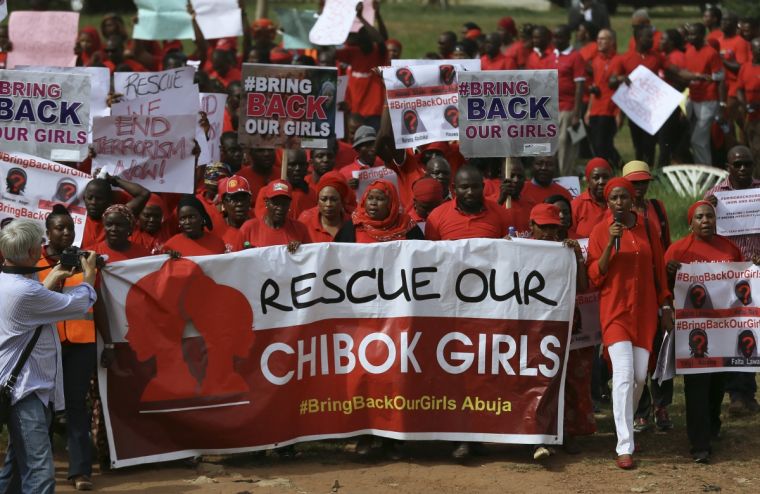Year in review: The biggest church stories of 2014
No news is good news, the saying goes, which is to imply that lots of news is bad – and there has certainly been a lot this year. In many ways a review of the events of the last 12 months makes for sad reading. It has been a year of growing intolerance as right-wing parties have advanced across Europe, and growing persecution of Christians and other minorities around the world. The Church has had some sad knocks to its credibility, and appears to be in a state of terminal confusion about what to think about the whole sexuality thing. On the other hand, in Pope Francis and Justin Welby, two remarkably winsome and effective leaders have been increasingly making their mark: so some news, at least, is good. Here then, are some of the stand-out church stories of 2014.
1. Mark Driscoll and the collapse of Mars Hill
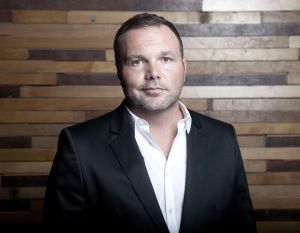
Mark Driscoll, the former pastor of Mars Hill church in Seattle, resigned from his position and the church collapsed. The story of his behaviour, and that of the rest of the church's leadership, has been told exhaustively and makes depressing reading. It all started so well, and so much good was done, but the whole enterprise became an object lesson in what happens when a powerful and dominant personality isn't adequately controlled: bullying, coercion, psychological abuse and financial irregularities have all been alleged. Arguably, it happened because Mars Hill was focused on getting results, expanding like a business instead of living like a church. Whatever the underlying causes, it ended up as a Greek tragedy.
It hasn't been great for the witness of the Church in general, but on the other hand, many lives were genuinely changed because in Mark Driscoll people who'd never normally go near a church found someone who talked their language and showed them a path to faith.
2. The coming out of Vicky Beeching

Vicky Beeching, the worship leader and social commentator, came out as a lesbian, sending the evangelical world into a flurry of soul- and scripture-searching. Beeching, whose songs were widely sung in America's Bible Belt, had been researching biblical views of sexuality for a doctoral thesis, and used an interview with the The Independent to declare her sexuality. Among other revelations was the fact that the tensions between what she thought was right and what she felt she was had led to a serious illness.
Beeching was criticised in parts of her evangelical constituency, with some churches refusing to use her songs any more, and was the target of some particularly nasty abuse. In other parts she was praised for her honesty and seems perfectly happy to act as a spokeswoman for 'accepting evangelicalism', adamant that she is no less an evangelical for being gay. One way or another it has been difficult to avoid the whole sexuality thing this year, as the first UK same-sex marriages took place in March, and then there was...
3. Oasis and the Evangelical Alliance part ways

After much behind-closed-doors wrangling, the Evangelical Alliance (EA) decided to 'discontinue the membership' of Steve Chalke's Oasis UK charity. The move followed the publication by Chalke of an article in Christianity magazine in January 2013 in which he said he no longer believed that same-sex relationships were sinful. The EA said that it had asked Oasis to "adjust the content of their website/resources and social media output to equally profile the traditional Christian view" of sexuality; Oasis said "We have made several changes to our online content and believed that we had reached a point where both parties could be satisfied that our relationship would continue." Not so, however.
Chalke has form when it came to upsetting the Alliance: in 2004 he wrote The Lost Message of Jesus with Alan Mann, in which he referred to the traditional evangelical view of penal substitutionary atonement as "cosmic child abuse". He maintains that he is still an evangelical, though relationships with most visible expression of evangelicalism appear increasingly fractured – and who defines evangelicalism, anyway?
4. Persecution of Iraqi Christians intensifies, and finally gets noticed
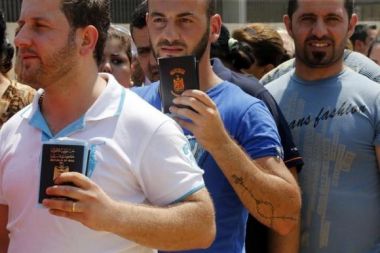
The continuing tragedy of the Middle East rightly dominated both Christian and secular media during the year. The terrible civil war in Syria was eclipsed by the dramatic and completely unexpected rise of Islamic State, which made sweeping territorial gains in Iraq against an ineffective Iraqi army. Religious figures lined up to warn of the parlous position of the region's Christian minority, to no avail. Ancient Christian centres have been emptied of their populations amid scenes of dreadful brutality. The 'international community', such as it is, terrified of becoming embroiled in further conflicts in a country that has sucked in vast quantities of blood and treasure over the last decade, has largely confined itself to humanitarian relief. In the meantime, the deaths and displacements have continued and predictions of the virtual extinction of Christianity in the lands where it has been established for longest appear to be coming true.
5. The Church of England (finally) allows women bishops
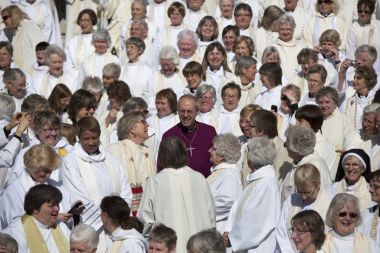
In such a context, a minor detail of Church administration may not seem terribly significant. However, the fact that the Church of England at last, after many, many years of agonizing over the question, agreed to the consecration of women as bishops, was a truly momentous step. In mid-December, it was announced that the new bishop of Stockport would be Rev Libby Lane, currently a vicar in the Chester diocese. Lane will be consecrated in January 2015.
Perhaps it is fair to say that as well as the genuine theological difficulties which many opponents have – the propriety of the Church of England taking such a step without a proper ecumenical council and the barrier it throws up to ecumenical conversations with the Roman Catholic and Orthodox Churches, for instance – the sense that the world is changing in ways that call for the robust digging in of heels is also a factor. Here, of course, we are back to gay marriage again. However, it is difficult to see the Church of England becoming anything like as liberal as the Episcopal Church USA. Reform-type evangelicals, Anglo-Catholics and all those in between will have to learn to live together.
6. Methodist Church attendance goes into freefall
The news is not so rosy for the Methodist Church. Figures came out this year indicating that it had lost a third of its membership in 10 years and that there were only around 200,000 Methodists in the country. Worse news lay in the details: a substantial number of those who are left are of an elderly persuasion and in the natural course of events time will add their individual contributions to a further steep decline.
It is hard to know exactly why Methodists should be so afflicted, when Anglicans are not, and even harder to know what to do about it. It is also difficult to see anyone asking the really hard questions about what might turn the ship around. Among these questions is whether it is the unique Connexional structure of the denomination, with its Circuits and Districts all strictly accountable to a high-spending, highly-organised and multi-layered central administration, which is part of the problem rather than part of the solution. A command economy in a free-market world, perhaps?
7. Meriam Ibrahim sentenced to death while pregnant, gives birth in shackles, finally released
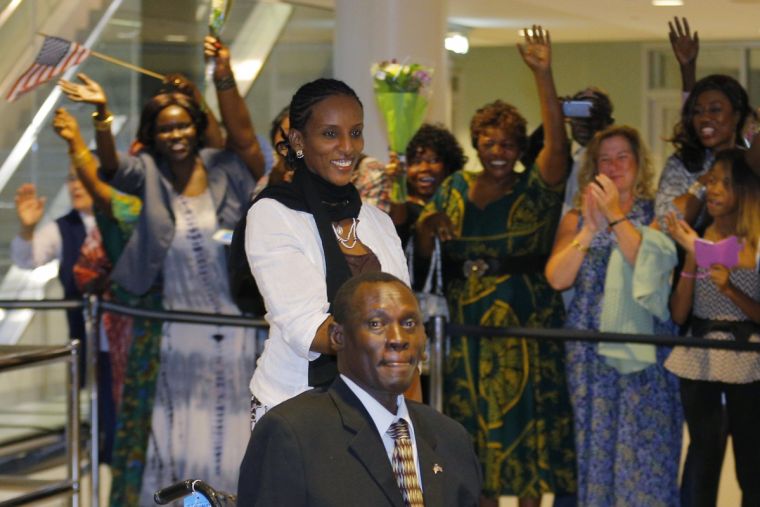
A pregnant Christian Sudanese woman, Meriam Ibrahim, was arrested, accused of apostasy and told that she would be executed if she did not convert to Islam. As the daughter of a Muslim father and Ethiopian Orthodox mother, Sudan regarded her as a Muslim though she had never practised that faith. She refused to convert and was duly condemned, giving birth to her daughter in jail, still shackled to the floor. World-wide outrage and behind-the-scenes diplomatic manoeuvering led to her eventual release and she was reunited with her husband in the US, but the episode threw into stark relief the position of minorities in Sudan, which in theory has religious freedom.
8. Pakistani Christians burned alive in a brick kiln
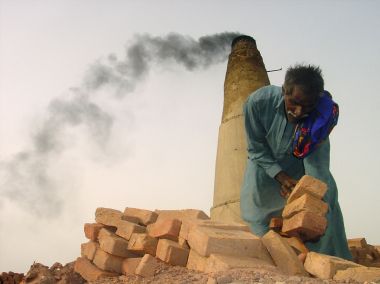
A story full of horror from Pakistan: the pregnant Shama Bibi and her husband Shahbaz Masih were beaten and thrown into a brick kiln, possibly to be burned alive. They were Christians in a fiercely conservative and very poor Muslim community and they paid the ultimate price for their faith, falling foul of the country's blasphemy law, which provides such ready ammunition for the settling of private and communal scores.
Not just in its religious undertones but in the murkier details of a family feud which may have lain behind it, their story echoes Miriam Ibrahim's. Both of them illustrate the need for the highest Islamic authorities to issue categorical statements condemning the death penalty – preferably full stop, but certainly for religious 'offences'. If this is beyond Muslim theologians, it risks bringing Islam itself into disrepute. It's the ideology behind this barbarism that needs to be challenged.
9. Grand Imam in Cairo condemns Islamic State
Speaking of which, an enormously significant conference on a similar theme in Cairo went almost unreported by the secular press, whose capacity for informed religious journalism seems to be declining just as the need for it is increasing. Obviously Muslims don't have a single figure who can simply declare what is Islamic and what is un-Islamic (how much simpler everything would be if they did!) but the Grand Imam of Cairo's al-Azhar mosque is a person of great prestige and authority. He issued a blanket condemnation of the ideology of Islamic State and other jihadis: they've just got it wrong, he said. Now, the real hard-line fundamentalists aren't going lay down their weapons at his say-so – they have convinced themselves that no one after the first generation of Muslims offers a true and righteous interpretation of Islam – but there are many young Muslims in Britain and elsewhere who are wavering, and who might be rescued from futile and probably suicidal trips to Iraq and Syria by words such as these. If the tide really does start to turn against Islamic State, it will have begun in Cairo; a pity so few seemed to notice.
10. 274 Nigerian schoolgirls kidnapped and repeatedly raped by Boko Haram militants
The fate of 274 mainly Christian schoolgirls kidnapped by the Boko Haram terrorist militia in Nigeria in April gripped the world. Some of them were later freed or escaped, but most of them are still captives, dispersed throughout the region and forcibly 'married' to terrorists. Nigeria faced widespread criticism for the failure of its army to defend schools and other institutions and for the ineffectiveness of its response. A social media campaign was mounted which involved celebrites all the way up to Michelle Obama, with the "Bring back our girls" slogan liked, shared and retweeted wholesale. The disapproval of millions of Facebook and Twitter users failed to influence Boko Haram in the slightest, however, entirely predictably: the girls have not been brought back, and it appears unlikely that they ever will be. The few who did escape reported being raped every day; Boko Haram continues to kidnap and traffick women.
Was the Bring Back Our Girls campaign as pointless and self-indulgent as it seemed at the time? Perhaps it helped people express their feelings at what had happened, but such things rely on the people they are attempting to influence sharing a certain moral ground and system of values with those who are trying to influence them. In this case they do not; Western liberal finger-wagging is met with incomprehension and amusement. They just need to be stopped.
